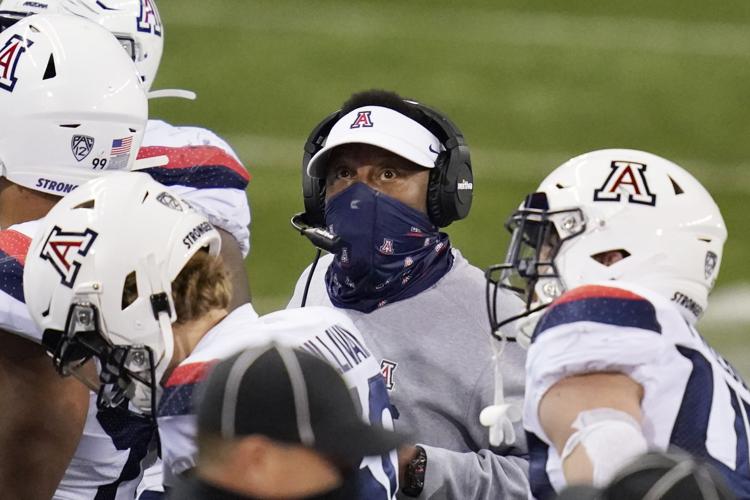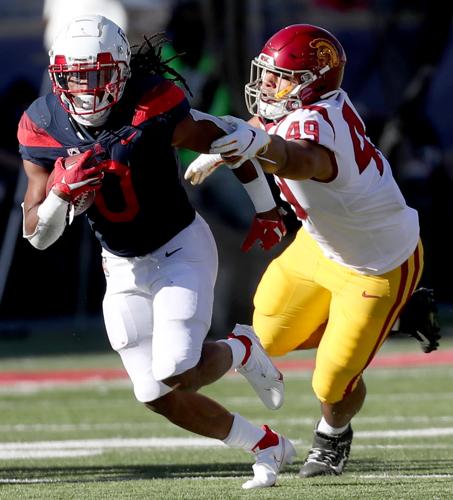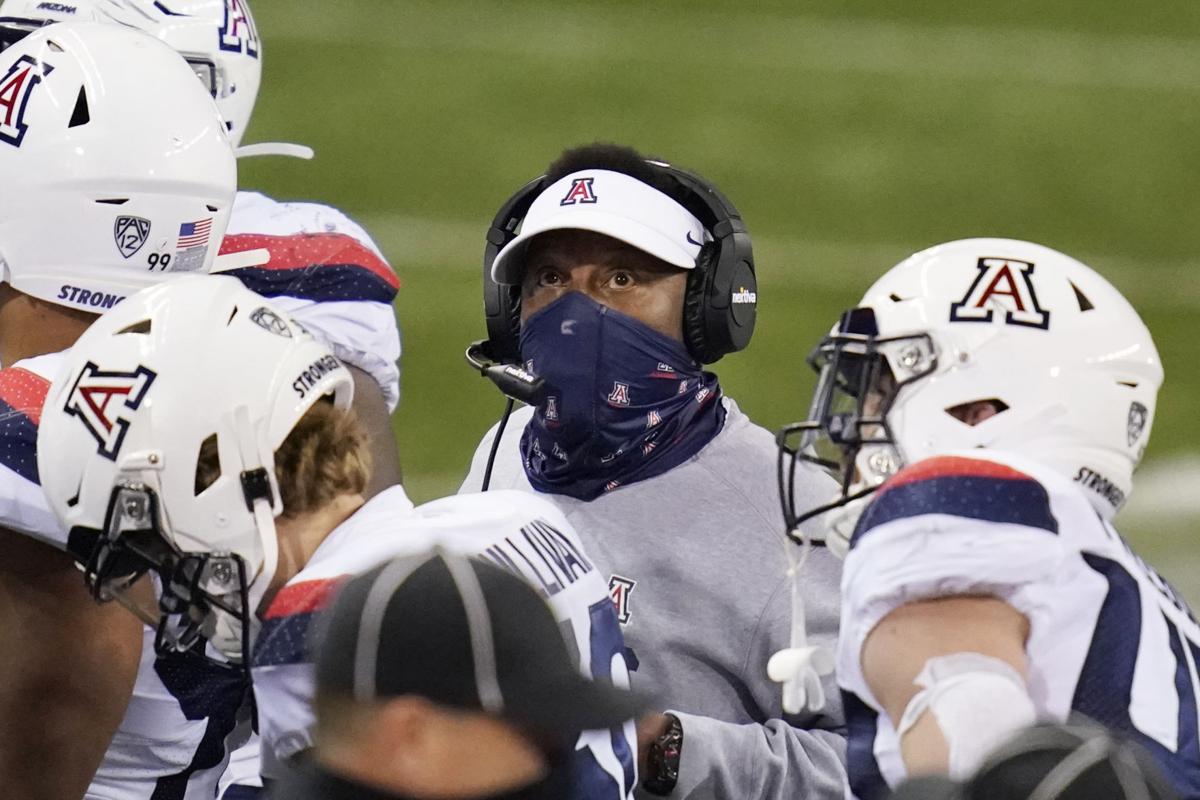Arizona’s losing streak is really something, isn’t it? No, not that one.
In addition to dropping nine straight games — a school record no one wants to be associated with — the Wildcats have lost four in a row at UCLA, where they play Saturday. It’s a lot.
The 0-2 Cats carry a heavy psychological burden with them to the Rose Bowl. The negativity is hard to shake. Last week’s loss at Washington was deflating after an encouraging opener.
“It’s been tough,” said defensive tackle Aaron Blackwell, who arrived in Tucson in January as a graduate transfer. “I’ve been in a couple games like that before, unfortunately, in my time at New Mexico. I’ve been trying to tell the guys, ‘Hey, you can either sit on this and let it become the norm, or you can take a chop to the mouth and come back and work even harder. You can turn it into a positive.’ ”
No one can question the Wildcats’ desire to win. Everything else — personnel, execution, coaching — remains a question mark until proven otherwise.
What will it take to turn this thing around? Below, we offer five keys to ending those dueling losing streaks, starting with the UA’s mental game.
1. Eliminate negativity
The reality is undeniable and pervasive. It’s all over social and mainstream media. But the Wildcats cannot let it consume them.
“We just can’t pay attention to that,” senior tight end Bryce Wolma said. “It’s all about us. That’s a phrase we use. Really, what happens inside the walls here at Arizona football is all that matters. Things that people say ... shouldn’t affect us, how we play or how we feel.
“If we stay focused on ‘losing streak, losing streak,’ that’s just gonna take away from the preparation. It’s going to screw up our mental focus.
“In reality, the only thing we can do is go out this weekend and prepare to win. What we’ve done in the past, at this point, doesn’t matter.”
Wolma said his advice to the younger players who haven’t experienced failure like this before is to “just go out and have fun and be confident in your abilities.” Wolma also described this year as “a free season in a sense” — “It doesn’t hurt anyone’s eligibility,” he noted — and the Wildcats’ demeanor ought to reflect that. Rival Arizona State hasn’t played since Nov. 7 because of COVID-19.
“We got to keep playing hard and play for each other,” linebacker Jalen Harris said. “I think that’s the most important part — remind each other why we’re playing this game.”
2. Carry over momentum
We’ve established that the Wildcats need to keep the past in the past. But something positive did happen in Seattle, and it could help Arizona upset UCLA.
After an abysmal three quarters, the Wildcats outscored the Huskies 27-7 in the fourth. Yes, most of that came against UW’s backups. And the Huskies’ intensity level undoubtedly dropped when their lead reached 37 points and became insurmountable.
But that fourth-period surge has to count for something, right?
“Yes and no,” UA coach Kevin Sumlin said. “Individually, for some of those young guys that came in there and played, there’s some confidence that they can get out of it.
“But obviously there’s a reason why the backups are in there. The most important thing is to come back to work … with those guys that were playing early in the game and get them to get their confidence to the level it was a week ago (against USC).
“It’s all about the team. That’s where our work has to get done this week.”
The fourth quarter provided opportunities for at least three freshmen — tailback Jalen John, receiver Ma’jon Wright and offensive lineman Josh Baker — to get valuable reps. Veteran Stanley Berryhill III also further cemented his place as one of Arizona’s most reliable and productive receivers.
3. Win the ground war
It’s no secret that Arizona’s offensive line struggled against Washington. The unit surrendered five sacks and had yielded a league-high nine entering this weekend.
In lieu of personnel changes, how can this problem be fixed in a week’s time? How about asking the line to do less pass blocking?
Arizona needs to take its lead from UW coach Jimmy Lake’s hat and “run the damn ball.” It’ll require patience and dedication, but it would help achieve a critical goal: alleviating pressure on sophomore quarterback Grant Gunnell.
“As an offense,” Wolma said, “we gotta do a better job of just helping him out, kind of relieve some stress off his plate, because he was definitely dealing with a lot.”
Gunnell made his first career start against UCLA last season and operated a pass-heavy attack. He attempted 44 passes. Running backs carried the ball 20 times. Arizona won 20-17.
Could that formula work again? Sure. But the offensive line needs to regain its confidence, and establishing the run is the best way to do that.
UA running backs, led by Gary Brightwell, are averaging 5.1 yards per carry. Cal and Oregon struggled to establish the run vs. UCLA, and the Bruins are allowing only 3.4 yards per carry, second lowest in the Pac-12 entering this weekend.
However, if you adjust for sacks, that figure climbs to 4.2. Colorado rushed for 264 yards against UCLA in Week 1.
4. Improve on third down
This applies to both sides of the ball. It’s been a significant problem so far.
Arizona ranked 11th in the Pac-12 in third-down offense and ninth in third-down defense entering the weekend. Against Washington, the contrast was stark: The Wildcats went 2 of 13, the Huskies 8 of 15.

Arizona running back Gary Brightwell (0) runs out of the grip of USC defensive lineman Tuli Tuipulotu (49) in the second quarter of their Pac 12 game at Arizona Stadium, Tucson, Ariz., November 14, 2020.
“We couldn’t stay on the field on offense, and they continued to make third-down conversions, even third-and-8 and more,” Sumlin said. “That’s a recipe for disaster against a football team like that, that has that much talent.”
As several UA defenders have pointed out, the Wildcats actually did a good job against Washington’s run game early (3.4 yards per carry in the first half). They put the Huskies in third-and-long situations. But UW exploited Arizona’s lack of a pass rush and found holes in its secondary.
Washington’s first touchdown came on a third-and-10. In the second quarter, a Huskies TD drive featured conversions on third-and-9 and third-and-12.
“We’ll put them in third-down situations, but it’s almost like we’re missing that last piece of the puzzle,” Blackwell said. “That’s a huge thing that we need to correct.”
Despite UW’s success, third-and-long is not desirable for any offense. Ten of Arizona’s 13 third downs required a gain of 6 yards or longer. The Wildcats’ average was 8.5 yards.
5. Take the ball away
Considering all its other issues, Arizona cannot be expected to win unless it generates a takeaway or two.
The Wildcats have yet to produce one this season and have forced just five turnovers in their past 11 games (starting with UCLA last year). They also have only one sack this year.
Asked how much it would help the cause if Arizona could up its sack and takeaway totals, Blackwell said: “Immensely.”
If it’s ever going to happen, this could be the week. UCLA has nine turnovers, most in the Pac-12 entering this weekend. Arizona is the only team in the league that has yet to force a turnover.






